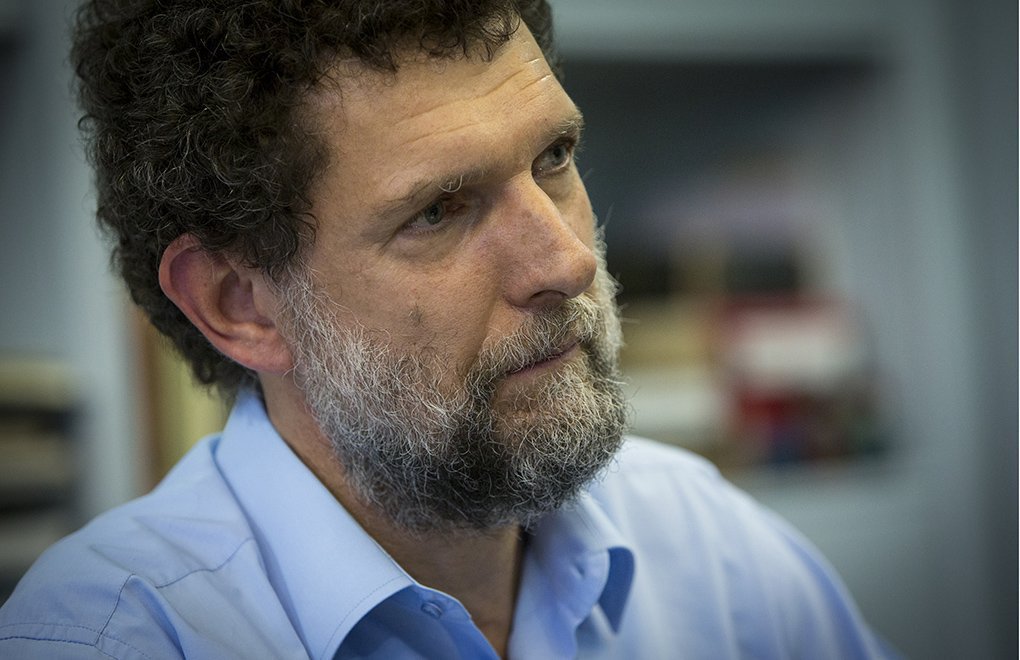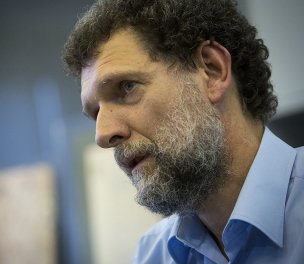Click to read the article in Turkish
After the European Court of Human Rights (ECtHR) has given a ruling of right violation and release for arrested businessperson and rights defender Osman Kavala, who has been behind bars for the last 773 days as part of Gezi trial, the ruling has been translated by lawyers Benan Molu, Polat Yamaner and Ramazan Demir into Turkish and published on www.anayasagundemi.com website.
CLICK - ECtHR: Release Osman Kavala Immediately
The judgement has underlined that Kavala's pre-trial detention is not based on a reasonable suspicion, but "pursued an ulterior purpose, namely that of reducing Osman Kavala, and with him all human-right defenders, to silence."
Referring to the "total duration of the Constitutional Court's review of legality in the context of Kavala's individual application", the ECtHR has concluded that the proceedings conducted by the court "could not be considered compatible with the speediness requirement" of the ECtHR.
Accordingly, the ECtHR has unanimously ruled that there had been a violation of Article 5/1 (right to liberty and security) of the European Convention on Human Rights, and a violation of Article 5/4 (right to a speedy decision on the lawfulness of detention) of the Convention.
The Court has said, "By six votes to one, that there had been a violation of Article 18 (limitation on use of restrictions on rights) taken together with Article 5 § 1, and that the respondent State was to take every measure to put an end to the applicant's detention and to secure his immediate release."
It has also been underlined in the judgement, "In the Court's opinion, the various points examined above, taken together with the speeches by the country's highest-ranking official (quoted above), could corroborate the applicant's argument that his initial and continued detention pursued an ulterior purpose, namely to reduce him to silence as a human-rights defender. (...) The Court is also aware of the concerns expressed by the Commissioner for Human Rights and the third-party interveners, who consider that the applicant's detention is part of a wider campaign of repression of human-rights defenders in Turkey."
Summary of ECtHR ruling on Kavala
The ECtHR has released the following press release, sharing details and highlights from the full ECtHR ruling:
"In today's Chamber judgment in the case of Kavala v. Turkey (application no. 28749/18) the European Court of Human Rights held:
"unanimously, that there had been a violation of Article 5 § 1 (right to liberty and security) of the European Convention on Human Rights, and a violation of Article 5 § 4 (right to a speedy decision on the lawfulness of detention) of the Convention;
"by six votes to one, that there had been a violation of Article 18 (limitation on use of restrictions on rights) taken together with Article 5 § 1, and that the respondent State was to take every measure to put an end to the applicant's detention and to secure his immediate release.
"In this case, Mr Kavala, a businessman who has been involved in setting up numerous non-governmental organisations ("NGOs") and civil-society movements which are active in promoting and protecting human rights, argued that his arrest and placement in pre-trial detention had been unjustified.
"The Court noted that Mr Kavala had been placed in pre-trial detention on account of a "strong suspicion" that he had committed two offences: attempting to overthrow the Government and attempting to overthrow the constitutional order, through force and violence.
"The Court found that the authorities were unable to demonstrate that the applicant's initial and continued pre-trial detention had been justified by reasonable suspicions based on an objective assessment of the acts attributed to him. It also noted that this measure had essentially been based not only on acts that could not be reasonably considered as behaviour criminalised under domestic law, but also on acts which were largely related to the exercise of rights guaranteed by Articles 10 and 11 of the Convention, and that those acts had been non-violent. In the absence of facts, information or evidence showing that Mr Kavala had been involved in criminal activity, he could not reasonably be suspected of having attempted to overthrow the Government by force or violence.
"With regard to the total duration of the Constitutional Court's review of legality in the context of Mr Kavala's individual application and to what was at stake, the Court concluded that the proceedings by which the Turkish Constitutional Court had ruled on the lawfulness of Mr Kavala's pre-trial detention could not be considered compatible with the "speediness" requirement of Article 5 § 4.
"Lastly, the Court held that, having regard to the material in the file, it had been established beyond reasonable doubt that the measures complained of in the case pursued an ulterior purpose, contrary to Article 18, namely that of reducing Mr Kavala, and with him all human-rights defenders, to silence.
"In consequence, having regard to the particular circumstances of the case and the grounds on which it had based its findings of a violation, the Court considered that the Government was to take every measure to put an end to the applicant's detention and to secure his immediate release.
Principal facts
"The applicant, Mr Mehmet Osman Kavala, is a Turkish national who was born in 1957 and lives in Istanbul (Turkey). He is currently detained and is suspected by the authorities of attempting to overthrow both the Government and the constitutional order. Mr Kavala is a businessman who has been involved in setting up numerous non-governmental organisations ("NGOs") and civil-society movements which are active in the areas of human rights, culture, social studies, historical reconciliation and environmental protection.
"Mr Kavala was arrested in Istanbul on 18 October 2017 on suspicion of attempting to overthrow the Government and the constitutional order through force and violence. The charges against him were linked to the Gezi Park events and to the attempted coup d'état of 15 July 2016.
"In May 2013, following the start of demolition work in Gezi Park, – a green space in the centre of Istanbul –, environmental activists and local residents occupied the area. On 31 May 2013 the police intervened violently. The protests escalated in June and July 2013 and spread to several towns and cities in Turkey. Four civilians and two police officers were killed, and thousands of people were wounded.
"Moreover, during the night of 15 to 16 July 2016 a group of members of the Turkish armed forces attempted to carry out a military coup aimed at overthrowing the Parliament, Government and President of Turkey. During the night of violence, more than 250 people were killed and more than 2,500 were injured. The national authorities blamed the network linked to Fetullah Gülen, a Turkish citizen living in the United States and considered to be the leader of an organisation described by the Turkish authorities as FETÖ/PDY ("Gülenist Terror Organisation/Parallel State Structure").
"From 21 July 2016 the Government declared a state of emergency for a period of three months; this state of emergency was subsequently extended for further periods of three months by the Council of Ministers, chaired by the President. The Turkish authorities gave notice to the Secretary General of the Council of Europe of a derogation from the Convention under Article 15.
"On 31 October 2017 Mr Kavala, assisted by his lawyers, was questioned by police officers from the anti-terrorist branch of the Istanbul Security Headquarters. On 1 November 2017 the public prosecutor's office called for Mr Kavala to be placed in pre-trial detention for "attempting to overthrow the constitutional order through force and violence" (Article 309 of the Criminal Code) and for "attempting to overthrow the Government or to prevent, through force and violence, the authorities from exercising their functions" (Article 312 of the Criminal Code). In justifying the suspicions in relation to the Gezi events, the prosecutor's office alleged that Mr Kavala had led and organised demonstrations which were in fact an insurrection in which all the terrorist organisations had actively participated, with the aim of overthrowing the Government. On 8 November 2017 Mr Kavala lodged an objection against the order for his pre-trial detention. On 13 November 2017 the Istanbul 2nd magistrate's court dismissed the appeal, on the grounds that the contested decision had complied with the procedure and the law.
"Between November 2017 and August 2018 Mr Kavala submitted several applications for provisional release. In addition, the relevant magistrate's courts examined, of their own motion, the applicant's continued detention on several occasions and ordered that the measure be extended.
"On 19 February 2019 the Istanbul public prosecutor's office filed a bill of indictment in respect of Mr Kavala and 15 other suspects, accusing them, in particular, of having attempted to overthrow the government by force and violence, within the meaning of Article 312 of the Criminal Code, and of having committed numerous breaches of public order.
"In the meantime, on 29 December 2017 the applicant lodged an individual application with the Constitutional Court. On 28 June 2019 the CCT published its judgment, in which it concluded by 10 votes to 5 that there had been no violation of Article 19 of the Constitution. It declared admissible the complaint made by Mr Kavala with regard to the lawfulness of the order placing him- in pre-trial detention, but held that there had been no violation of Article 19 of the Constitution. It dismissed the complaint regarding the lack of a public hearing when examining the applications for release. The Turkish Constitutional Court held that the findings that there existed factual evidence giving rise to a strong suspicion concerning his responsibility and that he had committed the alleged offence during the Gezi events, the ultimate aim of which was the overthrow of the Government, seemed neither arbitrary nor unjustified. As to the complaint regarding the lack of a public hearing when examining the applications for release, the Turkish Constitutional Court noted that in the period between 1 November 2017 and 30 April 2019 the applicant had not been brought before the courts which were required to decide on the extension of his pre-trial detention. Holding that he had had the opportunity to bring an action for damages, it nonetheless declared this complaint inadmissible for failure to exhaust the ordinary remedies.
Complaints, procedure and composition of the Court
"Relying on Article 5 §§ 1 and 3 (right to liberty and security), the applicant complained about his initial and continued pre-trial detention, which he considered arbitrary. He alleged that there was no evidence grounding a reasonable suspicion that he had committed a criminal offence necessitating his pre-trial detention. He maintained that the domestic courts had given insufficient reasons for the decisions ordering and extending his pre-trial detention.
"Relying on Article 5 § 4, he submitted that the Constitutional Court had not complied with the requirement of "speediness" in the context of the individual application he had brought before it to challenge the lawfulness of his pre-trial detention. Relying on Article 18 (limitation on use of restrictions on rights), he asserted that his Convention rights had been restricted for purposes other than those prescribed in the Convention.
"In particular, he submitted that his placement in detention was intended to punish him as a critic of the Government, to reduce him to silence as an NGO activist and human-rights defender, to dissuade others from engaging in such activities and to paralyse civil society in the country. The application was lodged with the European Court of Human Rights on 8 June 2018.
Decision of the Court
Article 5 § 1
"The Court reiterated that a person could be detained under Article 5 § 1 (c) only in the context of criminal proceedings, for the purpose of bringing him or her before the competent legal authority on reasonable suspicion of having committed an offence. The term "reasonable" meant the threshold that the suspicion must meet to satisfy an objective observer of the likelihood of the accusations.
"The question was then whether the deprivation of liberty was based on sufficient objective elements; in addition, the facts relied on had to be reasonably considered as falling under one of the sections describing criminal behaviour in the Criminal Code. Thus, there could not be a "reasonable suspicion" if the acts or facts held against a detained person did not constitute a crime at the time when they had occurred.
"The Court observed that the applicant had been placed in pre-trial detention on account of a "strong suspicion" that he had committed two separate offences: attempting to overthrow the Government and attempting to overthrow the constitutional order, through force and violence.
"The Court reiterated that in examining whether a reasonable suspicion existed for the arrest and detention of the applicant, the starting-point for its analysis had to be the national courts' decisions on his initial and continued detention. Moreover, given that the Constitutional Court had assessed the legality of the applicant's pre-trial detention, the Court was called upon to assess whether the reasoning adduced by that latter court, which had also had regard to the bill of indictment, had adequately demonstrated that a reasonable suspicion existed in support of the applicant's pre-trial detention at the point in time when the national courts had ordered that measure.
"The applicant was suspected of being the instigator and leader of the Gezi Park events, which, in the public prosecutor's view, were aimed at overthrowing the Government. It was to be noted, however, that during the interviews with the applicant during police custody, no question had been put to him about his possible involvement in committing the acts of violence which had occurred during those events. Moreover, there was no evidence in the file indicating that he had used force or violence, had instigated or led the violent acts in question or had provided support for such criminal conduct. Although it referred to "concrete evidence", the magistrate's detention order of 1 November 2017 did not contain any materials which would have satisfied an objective observer that there existed a reasonable suspicion that the applicant had participated in or supported such acts. Nor did any of the subsequent detention orders extending the applicant's detention refer to such material evidence. In the Court's opinion, this fact was of the utmost importance in this case, in that one aspect of the actus rea constituting the offence with which the applicant was charged – under Article 312 of the Criminal Code – was the use of "force" or "violence" to overthrow the Government. The Court also noted that in the bill of indictment the prosecutor's office had described these events as the result of action by a group of individuals who were influential in civil society and who had acted behind the scenes. This group of individuals allegedly formed a structure which was led in Turkey by the applicant, himself supported by foreign actors. The Court noted, however, that the acts attributed to the applicant were either legal activities, isolated acts which, at first sight, were unrelated to each other, or activities which were clearly related to the exercise of a Convention right; in any event, they were non-violent activities.
"The Court concluded that – in the absence of facts, information or evidence showing that the applicant had been involved in criminal activity – he could not reasonably have been suspected of having committed the offence of attempting to overthrow the Government by force or violence. In particular, the acts referred to were not sufficient to raise suspicions that the applicant had sought by force and violence to organise and fund an insurrection against the Government.
"With regard to the accusations concerning the attempted coup of 15 July 2016, the Court noted that these were predominantly based on the existence of "intensive contacts" between the applicant and a certain H.J.B., who was the subject of a criminal investigation for involvement in organising an attempted coup. In the Court's view, however, the evidence in the case file was insufficient to justify that suspicion.
"In conclusion, the Court considered that the evidence submitted to it was insufficient to support the finding that there had been a reasonable suspicion against the applicant at the time of his initial detention. Furthermore, it had not been shown that the evidence added to the case file following the applicant's arrest and throughout the period of his continued detention within the scope of this case had amounted to facts or information giving rise to a suspicion justifying the applicant's initial and continued detention. In consequence, the Court concluded that the authorities had been unable to demonstrate that the applicant's initial and continued pre-trial detention were justified by reasonable suspicions based on an objective assessment of the acts in question.
"With regard to Article 15 of the Convention, the Court referred to its finding that the evidence before it was insufficient to support the conclusion that there had been a reasonable suspicion against the applicant. That being so, the suspicion against the applicant had not reached the required minimum level of reasonableness. Although imposed under judicial supervision, the contested measures had thus been based on a mere suspicion. In consequence, the measures complained of in the present case could not be said to have been strictly required by the exigencies of the situation.
"The Court concluded that there had been a violation of Article 5 § 1 on account of the lack of reasonable suspicion that the applicant had committed an offence.
Article 5 § 4
"On 29 December 2017 Mr Kavala had lodged an individual application with the Constitutional Court. One year, four months and twenty-four days – including ten months and five days after the state of emergency had been lifted – had elapsed between the date on which the individual application was lodged with the Constitutional Court and the date on which that court had published the result of its deliberations. Regard was also to be had to the time elapsed between the above date and the date on which the final judgment was published. According to the Court's established case-law, the relevant period for the purposes of Article 5 § 4 began when an appeal was lodged with a court and ended on the day the decision was communicated to an applicant or to his lawyer. It followed that the period to be taken into consideration amounted to one year, five months and twenty-nine days.
"The Court could accept that in the present case the issues before the Turkish Constitutional Court were complex. However, there was nothing in the material before the Court to suggest that either the applicant or his counsel had contributed to prolonging the judicial review of the measure in question. In addition, following the applicant's lodging of his individual application the Constitutional Court had remained inactive for about ten months, in spite of the applicant's request to obtain priority processing of his case. The procedural delays were thus attributable to the authorities. The Court had found it acceptable in the cases of Mehmet Hasan Altan and Şahin Alpay (20 March 2018) and Akgün (2 April 2019) that the Constitutional Court's review might take longer.
"Notwithstanding the clear length of the relevant proceedings, the Court had found in those cases that the speediness requirement under Article 5 § 4 had been complied with. In those previous judgments concerning the "speediness" requirement, the Court had borne in mind the Constitutional Court's caseload following the declaration of a state of emergency, and had held that this was an exceptional situation. It had nonetheless stated that that finding did not mean that the Constitutional Court had carte blanche when dealing with any similar complaints raised under Article 5 § 4. In the present case, it sufficed to note that the length of the Constitutional Court's examination of the applicant's individual application had exceeded all of the time periods observed in the above-cited cases.
"The Court reiterated that where an individual's personal liberty was at stake, it applied very strict criteria in assessing the State's compliance with the requirement of speedy review of the lawfulness of detention. That was especially true in the present case, where the applicant had been held in pretrial detention without the possibility of appearing before a court for more than one year and seven months and all his requests for release had been rejected for the same stereotyped reasons. In addition, the restriction on access to the investigation file had remained in place until the adoption of the bill of indictment on 4 March 2019.
"In consequence, the Court considered that in the Turkish Constitutional Court, which had aprimordial role at national level in protecting the right to liberty and security, had failed to take proper account of the importance of the right in question The applicant had been arrested on 18 October 2017 and the bill of indictment for some of the charges against him had been filed only on 19 February 2019. This meant that for sixteen months after he had been placed in detention, the applicant had been held without having been charged by the prosecutor's office. As the Commissioner for Human Rights had pointed out, the extension of the applicant's detention in this way could have a dissuasive effect on the non-governmental organisations whose activities were related to matters of public interest. In the present case, speedy judicial review of this measure by the Constitutional Court could have dispelled any doubts about the necessity of placing the applicant in detention or extending the measure in question for such a long period.
"With regard to the derogation by Turkey, the Court noted that the state of emergency had been lifted on 18 July 2018 and that more than eleven months had subsequently elapsed before the Turkish Constitutional Court delivered its judgment.
"Having regard to the total duration of the Constitutional Court's review of legality in the context of the individual application and to what was at stake for the applicant, the Court concluded that the proceedings by which the Turkish Constitutional Court had ruled on the lawfulness of his pre-trial detention could not be considered compatible with the "speediness" requirement of Article 5 § 4. There had therefore been a violation of Article 5 § 4.
Article 18
"The Court reiterated its conclusion that the measures against the applicant had not been justified by reasonable suspicions based on an objective assessment of the alleged acts, but had essentially been based on facts which could not be reasonably considered as behaviour criminalised under domestic law, and also on facts which were largely related to the exercise of Convention rights.
"The Court observed that the apparent aim of the measure imposed on the applicant had been to conduct investigations into the Gezi events and the attempted coup, and to establish whether the applicant had indeed committed the offences of which he was accused. Given the serious disruption and the considerable loss of life resulting from these two events, it was perfectly legitimate to carry out investigations into these incidents. In addition, it could not be overlooked that the attempted coup had led to a state of emergency being declared throughout the country.
"However, it appeared that, from the outset, the investigating authorities had not been primarily interested in the applicant's presumed involvement in the public disorder which had occurred in the course of the Gezi Park events. During the police interview, the applicant had been asked many questions which, at first sight, had no connection with these events. Equally, some of the questions put to him had concerned his meetings with representatives of foreign countries, his telephone conversations with academics, journalists, NGO representatives, or the visit of an EU Turkey Civic Commission delegation. The Government had not submitted any comments on the relevance of this evidence in assessing the "reasonableness" of the suspicions in the present case.
"The Court also noted that the bill of indictment was far from making up for the deficiency described above. This document, 657 pages in length, did not contain a succinct statement of the facts. Nor did it specify clearly the facts or criminal actions on which the applicant's criminal liability in the Gezi Park events had been based. There was nothing in the case file to indicate that the prosecuting authorities had had objective information in their possession enabling them to suspect the applicant in good faith at the time of the Gezi events. In particular, the prosecution documents referred to numerous completely lawful acts that were related to the exercise of a Convention right and had been carried out in cooperation with Council of Europe bodies or international institutions. Those documents also referred to ordinary and legitimate activities on the part of a human-rights defender and the leader of an NGO, such as conducting a campaign to prohibit the sale of tear gas to Turkey or supporting individual applications
"Furthermore, the applicant had been arrested more than four years after the Gezi events and more than a year after the attempted coup, on charges related to these events. The Court considered it crucial in its assessment under Article 18 of the Convention that many years had elapsed between the events forming the basis for the applicant's detention and the court decisions to detain him. No plausible explanation had been advanced by the Government for this lapse of time. It was also important to note that those charges had brought following two speeches given by the President of the Republic in November and December 2018, in which the applicant's name had been cited. In the Court's view, it could only be noted that there was a correlation between, on the one hand, the accusations made openly against the applicant in these two public speeches and, on the other, the wording of the charges in the bill of indictment, filed about three months after the speeches in question. Those elements could corroborate the applicant's argument that his initial and continued detention had pursued an ulterior purpose, namely to reduce him to silence as a human-rights defender. Moreover, the fact that the prosecutor's office had referred in the bill of indictment to the activities of NGOs and their financing by legal means, without however indicating in what way this was relevant to the accusations it was bringing, was also such as to support that assertion. The Court was also aware of the concerns expressed by the Commissioner for Human Rights and the third party interveners, who considered that the applicant's detention was part of a wider campaign of repression of human-rights defenders in Turkey.
"In consequence, the Court considered it to have been established beyond reasonable doubt that the measures complained of in the present case pursued an ulterior purpose, contrary to Article 18 of the Convention, namely that of reducing the applicant to silence. Further, it considered that the contested measures were likely to have a dissuasive effect on the work of human-rights defenders. It found that the restriction of the applicant's liberty had been applied for purposes other than bringing him before a competent legal authority on reasonable suspicion of having committed an offence, as prescribed by Article 5 § 1 (c) of the Convention. There had therefore been a breach of Article 18 of the Convention taken in conjunction with Article 5 § 1.
Just satisfaction (Article 41)
"No claim for just satisfaction had been made during the communication procedure in the proceedings before the Chamber since 2018. In consequence, the Court made no award in this respect.
"Having regard to the particular circumstances of the case and the grounds on which it had based its findings of a violation, the Court held that the Government was to take every measure to put an end to the applicant's detention and to secure his immediate release.
Separate opinions
"Judge Bošnjak (concurring opinion) and Judge Yüksel (partly concurring and partly dissenting opinion) expressed separate opinions, which are annexed to the judgment."
PARTLY CONCURRING AND PARTLY DISSENTING OPINION OF JUDGE YÜKSEL - I - 1. As regards the applicant's complaint under Article 5 § 1 of the Convention, I concur with the finding that, in the particular circumstances of the present case, there has been a violation of that Article, but I cannot subscribe to the reasoning set out in the judgment. 2. The case-law of the Court does not define what is to be regarded as "reasonable" and states that it will depend upon all the relevant circumstances. Thus, an assessment of whether there existed "reasonable suspicion" justifying the applicant's detention is very delicate. I should like to start by noting that the notion of "reasonable suspicion" was defined by the Court as "the existence of facts or information which would satisfy an objective observer that the person concerned may have committed the offence" (see Fox, Campbell and Hartley v. the United Kingdom, 30 August 1990, § 32, Series A no. 182) In this regard, the fact that a suspicion is held in good faith is insufficient (see Rasul Jafarov v. Azerbaijan, no. 69981/14, § 116, 17 March 2016). Furthermore, the existence of reasonable suspicion requires that the facts relied on can reasonably be considered as criminal behavior under domestic law. In the present case, as was pointed out in the judgment, "The Court must ... take into account ... the authorities' concerns relating to the large number of deaths and injuries which occurred during those events and the public unrest caused. In this regard, it notes the information supplied by the Government to the effect that four civilians and two police officers lost their lives, thousands of people were wounded and numerous acts of vandalism were committed. The Court considers that in such circumstances it is perfectly legitimate for the authorities to investigate these incidents, in order to identify the perpetrators of these violent acts and to bring them to justice" (see paragraph 142 of the judgment). The applicant was suspected of being the instigator and leader of the Gezi events, which, as stated in the judgment, gradually transformed into violent demonstrations against the Government. The applicant was therefore placed in pre-trial detention on charges relating to the two offences set out in Articles 309 and 312 of the Criminal Code. In cases concerning the investigation and prosecution of serious offences, the Court affords some leeway to the national authorities. Yet this leeway is not unlimited, in particular in cases where the Court is called upon to examine a complaint under Article 5 of the Convention. Even the exigencies of dealing with terrorist crimes cannot justify stretching the notion of "reasonableness" to the point where the essence of the safeguard secured by Article 5 § 1 (c) is impaired (see Fox, Campbell and Hartley, cited above, § 32; Murray v. the United Kingdom, 28 October 1994, § 51, Series A no. 300-A; and O'Hara v. the United Kingdom, no. 37555/97, § 35, ECHR 2001‑X). 3. Although the bill of indictment, the decisions relating to the applicant's pre-trial detention, and the Constitutional Court's judgment could be considered as three groups of relevant documents for the assessment of the applicant's complaints under Article 5 § 1, the majority, in its assessment of those complaints, relies specifically and heavily on the bill of indictment. I disagree with this approach. In my view, in its assessment the majority should instead have relied on the decisions ordering the applicant's pre-trial detention. Firstly, I would refer to the case-law of the Court which states that "... it is not normally for the Court to substitute its own assessment of the facts for that of the domestic courts, which are better placed to assess the evidence adduced before them" (see Mergen and Others v. Turkey, nos. 44062/09 and 4 others, § 48, 31 May 2016, and Mehmet Hasan Altan v. Turkey, no. 13237/17, § 126, 20 March 2018). To the extent that the approach in the present judgment is in line with the dissenting opinions of the Constitutional Court's judgment, it should be noted that the dissenting judges made their assessment on the basis of whether there was "strong suspicion", which is a higher standard of protection than "reasonable suspicion". Pursuant to Article 19 (3) of the Constitution, individuals may be detained provided that there are strong presumptions that they have committed an offence. 4. Secondly and most importantly, I believe that in assessing the "reasonableness" of a suspicion, the Court generally relies on the order placing an applicant in detention and the judicial decisions on extending that detention (see Rasul Jafarov, cited above, §§ 119-120, and Merabishvili v. Georgia [GC], no. 72508/13, § 222, 28 November 2017). Indeed, the Court must be satisfied that the arrested person was reasonably suspected of having committed the alleged offence, based on the reasons set out in the decisions ordering and extending the applicant's detention. Although, as stated above, our case-law holds that the "reasonableness" depends upon all the relevant circumstances, in the instant case we have before us "very special circumstances" that require sufficient reasoning from the national judiciary. In this respect, I believe that the lack of adequate reasoning in the initial decision to detain the applicant and the subsequent decisions extending his detention could be considered as the basis of finding a violation of Article 5 § 1. Taking into account the lack of reasoning and lack of application of the proportionality standard in the context of the circumstances of the present case, the domestic courts failed to demonstrate that the applicant had instigated the violent events and thus to justify the reasonable suspicion of his having committed the related offence. In addition, by using stereotyped and formulaic reasons, they also failed to provide sufficient reasoning to justify the extension of the applicant's pre-trial detention. In conclusion, I believe that there has been a violation of Article 5 § 1, on the procedural ground stemming merely from the lack of adequate reasoning provided by the domestic courts. 5. As to the applicant's complaint under Article 5 § 4 of the Convention, I voted with my colleagues in finding of a violation of this provision, notwithstanding the excessive workload of the Constitutional Court. In my view, even if the applicant was also suspected of having committed an offence under Article 309 of the Criminal Code (attempting to overthrow the constitutional order), the present judgment considers this case to be more concerned with the Gezi Park events and not, strictly speaking, a "post-15 July case", and thus puts emphasis on the duration of the Constitutional Court's review after the state of emergency was lifted. I must point out that, having regard to the Court's approach as developed in the cases of Mehmet Hasan Altan (cited above), Şahin Alpay v. Turkey (no. 16538/17, 20 March 2018), and Akgün v. Turkey ((dec.) [Committee], no. 19699/18, 2 April 2019), I have doubts whether the conclusion would have been the same had the case concerned the measures taken following the attempted coup d'état of 15 July 2016. – II – 6. With regard to the applicant's complaint under Article 18 in conjunction with Article 5 § 1 of the Convention, I disagree with the view of the majority that there has been a violation of this provision. The majority considers it to have been established "beyond reasonable doubt" that the measures complained of in the present case pursued an ulterior purpose, contrary to Article 18 of the Convention. 7. Having regard to the burden-of-proof requirement in establishing that the measures complained of in the present case pursued an ulterior purpose, contrary to Article 18 of the Convention, I do not perceive sufficient grounds to conclude that this provision has been violated. The Court must base its decision on "evidence in the legal sense", in accordance with the criteria laid down by it in the above-cited Merabishvili judgment (§§ 309-317), and its own assessment of the specific relevant facts (see Khodorkovskiy v. Russia, no. 5829/04, § 259, 31 May 2011; Ilgar Mammadov v. Azerbaijan, no. 15172/13, § 140, 22 May 2014; and Rasul Jafarov, cited above, § 155). 8. It appears from the Court's case-law that in cases where there is a complaint under Article 18, in conjunction with Article 5 of the Convention, the Court primarily examines whether the applicant's deprivation of liberty pursued an aim that is compatible with the Convention (see Rasul Jafarov, cited above, §§ 153-163, and Khodorkovskiy, cited above, §§ 254-261). The Court then examines whether there is proof that the authorities' actions were actually driven by improper motives. Examination of this second limb depends on the specific circumstances of the case and I believe that such reasons were not present in the instant case, for the following reasons. Firstly, I attach particular importance to the special role of human-rights defenders in promoting and defending human rights, including their cooperation with the Council of Europe, and their contribution to the protection of human rights in the member States. However, in my view, this case, which is the first Turkish case in which the Court has examined the detention of an activist, cannot easily be proposed as a case about human-rights activism in general in Turkey. In the context of the present case, the applicant's activities must be assessed as part of a wider analysis. In this respect, I do not agree with the majority's conclusion that the initial and continued detention of the applicant pursued an ulterior purpose, namely to reduce him to silence as a human-rights defender and NGO activist. Secondly, I am sceptical of the link between the applicant's detention and the special role of human-rights defenders in promoting and defending human rights. As the majority noted, the applicant is an activist who played an important role in the Gezi Park events. He was accused of promoting those events, with civil disobedience as a starting point, and then of encouraging the spread of these actions across the country, with the aim of creating generalised chaos, by providing physical facilities, financial support and international contacts. As noted by the majority, given the serious disruption and the considerable loss of life resulting from these events, it was perfectly legitimate to carry out investigations into these incidents (see paragraph 221 of the judgment). It is clear from the Court's case-law that the status of an activist cannot be treated as a guarantee of immunity (see, mutatis mutandis, Khodorkovskiy, cited above, § 258). The mere fact that the applicant has been prosecuted or placed in pre-trial detention does not automatically indicate that the aim pursued by such measures was to restrict political debate (see Merabishvili, cited above, § 323-325). I do not discern sufficient evidence in the case file materials to substantiate such a serious allegation. Thirdly, the applicant did not produce any persuasive and concrete evidence suggesting that the present case was an illustration of pressure on civil society and human-rights defenders in Turkey in recent years, or that the use of a detention measure for that purpose was systematic. In the same domestic case criminal proceedings have been initiated against sixteen persons; some of the suspects in the same case are being tried, but have already been released pending trial. Thus, the applicant's situation can be viewed in isolation. Fourthly, it appears from the case file that the applicant's pre-trial detention has been examined on several occasions by national courts and, in particular, by the Constitutional Court. Even if I consider that the reasoning provided by the domestic courts was insufficient, this does not mean that the applicant's initial detention and continued detention did not have a legitimate aim. 9. In the light of the foregoing and without prejudice to a possible subsequent examination by the Court once the criminal proceedings against the applicant have been completed, I consider that in the present case there is insufficient evidence capable of supporting the applicant's allegation that the entire judicial mechanism of Turkey acted in line with a political agenda in instituting criminal investigations against him. |
(DB/SD)








-132.jpg)


-132.jpg)


